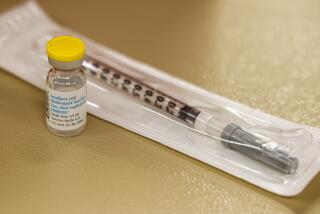Household Contact May Spread AIDS, Study Finds
- Share via
Preliminary findings from a new federal study in Zaire suggest that spouses and others who live with AIDS victims may be infected by the deadly virus through normal household contact, it was disclosed in Berkeley.
The study by scientists from the federal Centers for Disease Control and the National Institute of Allergy and Infectious Diseases indicates that anyone living with a victim is more likely to acquire the disease than someone who isn’t, Dr. Joseph McCormick, an investigator with the CDC, said in a lecture Wednesday at University of California, Berkeley.
It was the first time that such a possibility has been publicly noted, but federal health officials cautioned that it is still too early to draw any conclusions. It is not clear that the data “will demonstrate household transmission,” said CDC spokesman Donald Berreth.
McCormick, however, said: “We think our study suggests that living with a confirmed AIDS patient significantly increases the risk of infection.”
None of the more than 9,000 victims of AIDS, or acquired immune deficiency syndrome, reported in the United States is known to have contracted the disease through ordinary household contact. But health investigators reportedly found in their study of the households of 48 AIDS patients in Zaire that members of those households were more likely to have antibodies to the suspected AIDS virus in their bloodstream than those who lived elsewhere.
17% Had Antibodies
In the eight-month study, it was found that 17% of the 204 people who shared homes with those patients had the antibodies, McCormick said, compared to only 4% of the people not in those homes.
When spouses were excluded, 11% of the patients’ housemates were found to have the antibodies.
The presence of the antibodies only means that a person has been exposed, not that he or she will necessarily develop the disease.
AIDS patients have been studied in Zaire because it is believed the disease originated in that African country.
The study is to be presented in detail next week at an international AIDS conference in Atlanta. Investigators from the Africa project are scheduled to be there.
Majority Are Homosexuals
Scientific data available in the United States until now has indicated that AIDS probably is spread by sexual contact, injections with dirty needles and transfusions of contaminated blood. Occasionally it has been found to be passed from a mother to an unborn or newborn child. Three-fourths of the known American AIDS victims have been male homosexuals.
AIDS destroys the body’s immune system, leaving a patient vulnerable to various fatal illnesses.
One AIDS researcher conceded that the Zaire study “is going to raise a lot of concern.”
But others have pointed out that there are vast differences between living conditions in the United States and those in Africa, where malnutrition is commonplace, infectious diseases run rampant and sanitation frequently is non-existent.
Also, they have noted, there is some indication of slight genetic differences between the AIDS virus studied in Africa and that responsible for the disease in the United States. Although the significance of that difference is not known, it has been speculated by some researchers that it could mean one strain is more virulent than the other.
Lowered Resistance
Researchers also noted that resistance to infection in Africa is lowered by the presence of extreme malnutrition and innumerable diseases.
The new findings “can be understood only when the full data from the Zaire study becomes available,” Dr. Martin Finn, medical director for public health for the Los Angeles County Department of Health Services, said Thursday.
He pointed out that there has not been a single case on record of a medical person contracting AIDS by treating patients, suggesting that the disease is not spread by such means as airborne organisms.





